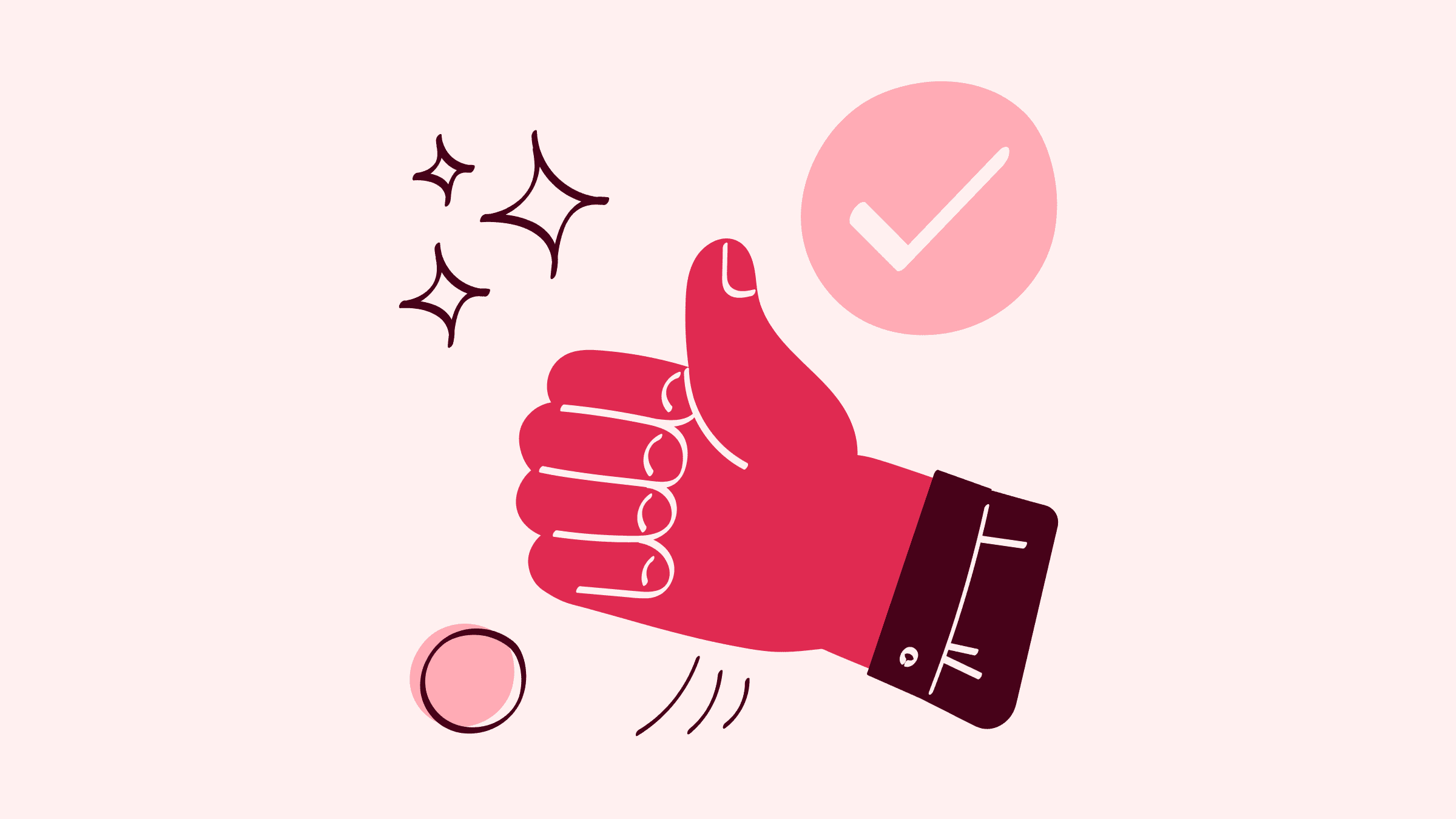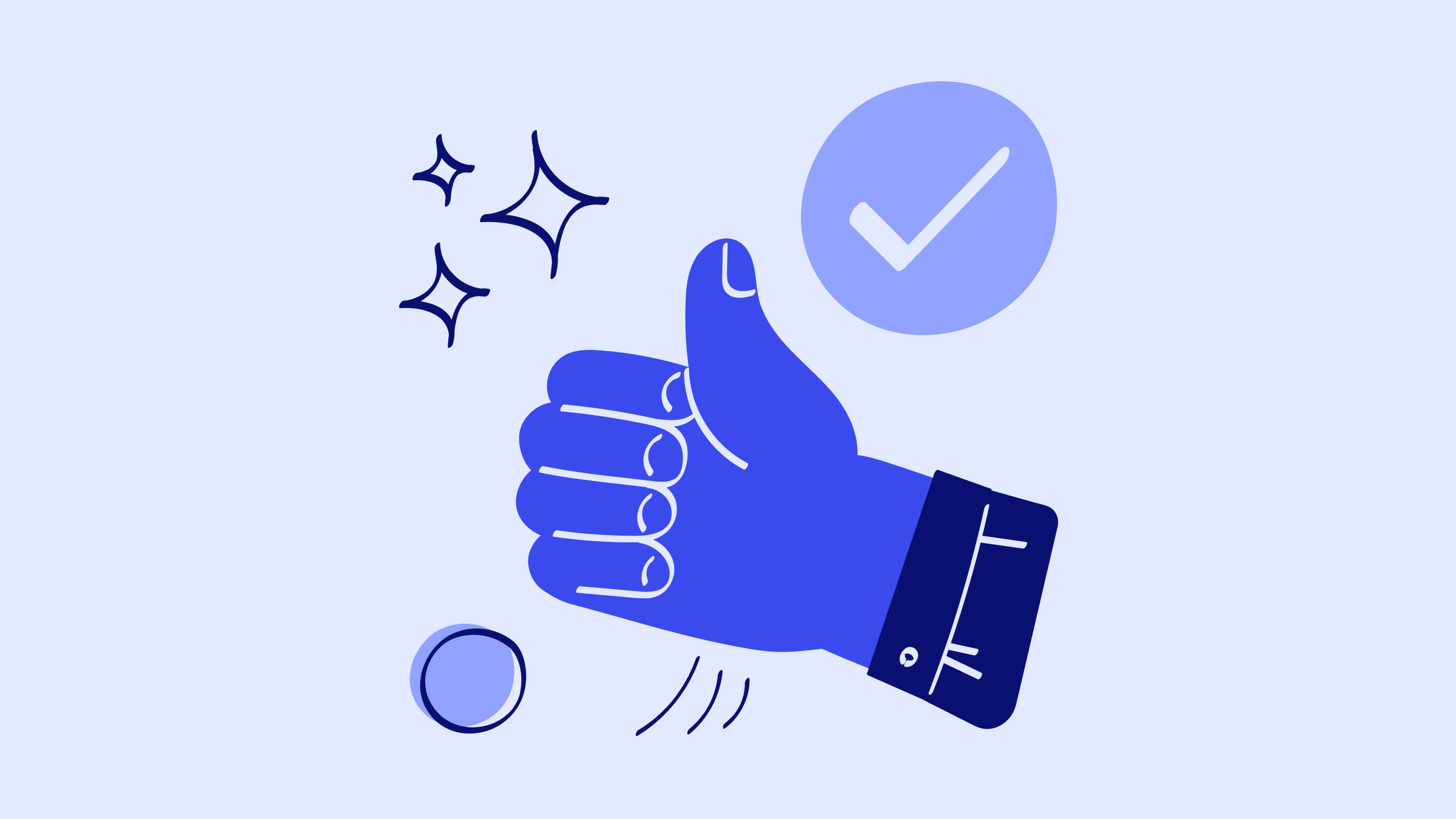The acronyms that describe software are confusing. CRM, ERP, HRSM… You’re probably left wondering, what does it all mean?
With so many options available to small business owners, it’s hard to know what you need and what you don’t.
To help clear things up, you’ll learn what CRM stands for in sales and the benefits of CRM software for small businesses.
What does CRM stand for in sales?
What CRM stands for is customer relationship management. While some companies may have a department dedicated to managing customer relationships, the term generally refers to business software with contact management and automation tools.
What does a CRM do?
Now that we’ve answered what CRM stands for in sales, let’s look at what a customer relationship management solution does.
The goal of a CRM is to house all the information about your current and potential customers. Your CRM application stores customer data and lead details like:
- Contact information.
- Order history.
- Sales activities.
- Marketing campaigns performance.
- Communication history.
- Customer support records.
- Social media profiles.
Because what CRM stands for is customer relationship management, that’s where the focus of the software lies. The primary benefit of a CRM solution is that it makes it easy for you to know the status of each of your customers and leads in real time.
For example, with just the click of a button, you can find out if someone has placed an order or if your sales rep followed up with a hot lead.
A CRM is also a powerful tool when it comes to upselling. When you know the buying habits of your customers, you can find out when they’re most likely to buy, and then reach out to them proactively. Also, by considering their order history, you can create personalized offers for each customer filled with products they can’t resist.
Do you need a CRM system?
Now that you know what CRM stands for in sales, let’s figure out if it makes sense for you to get one.
Here are a few questions that will help you figure out if you need a CRM software:
- Are there multiple people involved in your sales process?
- Do you struggle to find accurate, up-to-date information about your customers?
- Do you miss out on sales because some of your leads slip through the cracks?
- Does customer and lead management take up the majority of your time?
- Does your business rely on manual data entry and processes?
- Could you grow your customer retention rate?
If you answered yes to any of the above questions, you’d benefit from a CRM platform.
Features of a CRM
Contact management
Customer relationships are the key to a successful business. Customer relationship management software centralizes customer data so your sales teams can access it easily. This lets you segment and monitor customer information in a way that provides detailed customer insights.
CRM software also simplifies contact management and prioritizes potential leads so your employees know where to focus their efforts. It lets you track customer interactions across departments, which is especially helpful if your organization supports multi-channel communication.
Overall, a CRM system boosts team collaboration and enables data-driven decision-making in a way that enhances customer interactions.
Document management
CRM tools give you comprehensive tools to manage your documentation. From estimates and invoices for your customers to business expenses and payroll, you can organize everything in one accessible place. This increases overall business productivity across the company, as everyone always knows where to find the documents they need.
Sales process management
A CRM platform aligns sales and marketing efforts by prioritizing:
- Opportunity management.
- Lead tracking.
- Sales forecasting.
- Customer segmentation.
It monitors customer interactions and streamlines sales processes to elevate your business strategy. Through sales automation, CRMs provide a consistent way for your teams to input information while removing the chances of human error.
Targeted marketing campaigns
CRM systems with marketing integration show you your full interaction history with contacts. When leveraged, this information optimizes marketing campaigns and improves customer retention rates.
Look for a CRM that integrates with other business tools, such as Mailchimp, Outlook, or Google Workspace, to provide comprehensive analytics & reporting. By better understanding your customers, you can more easily nurture and convert leads and retain current customers.
Performance analysis
Monitor team performance with automated data input and reports. Identify areas for improvement and the things your team is doing well.
Understanding the quality and performance of your products or services is important for your team’s functionality and building future growth.
Technical support and customer service features
Many CRM systems offer a web-based customer service tool. Popular examples include 24/7 portals and automated chatbots. These tools integrate with your business system using user-friendly interfaces.
They let you collect and respond to positive customer feedback and customer complaints without interrupting your ability to offer personalized service at every hour of the day. Some CRM systems even use artificial intelligence to automate interactions with customers.
Whether you pay a one-time fee for your CRM or pay based on a SaaS (software as a service) model, this technology is worth it. CRMs provide a range of additional channels for your customers to communicate with your team and make purchases — even when your employees aren’t working.
What can you gain from a CRM tool?
Seeing that what CRM stands for is customer relationship management, its focus is to organize, nurture, and retain your customers. A CRM is a game-changing investment for small businesses. Here are some of the reasons why.
1. A deeper understanding of your customers
Your CRM is full of data that you can analyze to better understand your customer base. From the demographic details of your customers to their communication habits, you can use this information to define your ideal customer.
With data-driven, actionable insights, you can tailor your sales and marketing efforts to the preferences of your customers.
Our research indicates that 80% of businesses see an increase in revenue as a result of more targeted and personalized customer engagement. So, leveraging your CRM’s reporting and analytics functionality is a surefire way to increase your sales.
80% of businesses see an increase in revenue because of a more targeted and personalized approach to customer engagement.
— Forbes, 2020.
2. Increase your productivity
A huge benefit of a CRM solution is its workflow automation capabilities. By taking the manual labor out of tasks like data entry and activity tracking, a CRM gives you time back in your day. This is time you can dedicate to activities that attract repeat customers and positively impact your sales, like taking meetings with potential customers.
When looking for a CRM, consider cloud-based solutions with mobile accessibility so you can access customer data on the go, from anywhere with an internet connection.
3. Improve your customer service
Our investigation demonstrated that 80% of your business’ future profits will come from just 20% of your existing customer base. With this in mind, providing an excellent customer experience is crucial.
80% of your future profits will come from 20% of your existing customers.
— Small Business Trends, 2020
By letting your customers pay online 24/7 through customer portals, a CRM increases customer convenience and lets you focus on more complex customer requests.
Not to mention, a CRM ensures everyone on your team has access to up-to-date contact histories so that your customers don’t have to repeat information to every employee who helps them.
Recap: What does CRM stand for in sales and do you need one?
To review, what CRM stands for is customer relationship management software.
It’s a tool for you to manage your customers, leads, and sales pipeline. CRM solutions help you:
- Better understand your customer base.
- Leverage data-driven insights.
- Optimize your marketing and sales strategies.
- Automate business processes.
- Increase your productivity.
- Improve customer satisfaction.
How to choose the right CRM for your business
Identify your business needs
Make a list of what functionalities your company needs. Some requirements will be unique to your specific business, so make sure you choose a CRM platform that offers customizable workflows to give you the greatest flexibility.
Set a budget
Identify how much you’re willing to spend on a CRM software solution. Most providers charge monthly per user. So, knowing how many people on your team need to access customer relationship management information is something you’ll want to stay on top of.
Consider CRM systems that include a free trial so you have the ability to see if it works for your company before committing.
Evaluate user-friendliness
Many CRM tools are designed for larger companies that require a huge range of features. Small and mid-sized businesses often find these same CRM solutions bloated and difficult to learn.
Familiarize yourself with what you’re looking for in a CRM and find one with functionality that aligns with your needs to avoid this issue.
Customer relationship management solutions designed for small and mid-sized companies prioritize user-friendly interfaces and include only the functions you need to keep costs lower.
Check integration capabilities
Make a list of what other platforms you’re using, such as:
- Accounting software (i.e., QuickBooks and Xero).
- Email (i.e., Outlook, MailChimp, and Gmail).
- Workflow automations (i.e., Zapier).
- Payment gateways (i.e., Paypal).
Your CRM should provide third-party integrations with most, if not all, of your platforms.
Consider scalability
Is your company currently experiencing growth, or do you expect it to grow in the future? Then a CRM platform that scales alongside your business is crucial.
Otherwise, you may have to move your data to a new platform if your chosen CRM system:
- Caps users, customer data, or features.
- Lacks functionality you’ll need in the future.
- Doesn’t integrate well with new or existing tools.
Look into customization options
A customizable CRM automates repetitive tasks to save time across your whole company.
If your CRM system cannot provide functionality for all your unique workflows out of the box, customization lets you ensure those needs are still met.
Consider a no-code option so you can customize your CRM platform without hiring a developer.
This lets you avoid paying for a CRM with functions you don’t need and a higher price tag to match.
Prioritize data security
Data security is a problem that businesses of any size face. CRM software ensures data security and compliance by protecting both company and customer data with passwords and two-factor authentication.
Larger companies that do not require the mobile functionality that cloud-based solutions provide may instead opt for a CRM with only on-premises options. With these solutions, data is only accessible on site — typically an office.
On-premise security measures generally provide physical protection. Examples include:
- Keycards.
- Video monitoring.
- A security team.
Analyze reporting and analytics
Analytics reports are one of the main features of CRM software. The best systems provide highly detailed report generation with visual tools like graphs and charts to aid visibility..
This makes it easy to share analytics with managers and cross-collaborate with other teams.
Key takeaways
What CRM stands for is customer relationship management.
At its core, CRM software:
- Centralizes and automates your regular processes.
- Reduces time spent closing deals.
- Facilitates lead tracking.
- Segments customer lists effectively.
- Simplifies sales processes.
- Build strong customer relationships.
- Improve sales performances.
Now that you know what CRM stands for, consider its potential impact on your operations and the competitive edge it provides.
Frequently asked questions (FAQs)
Do I need a CRM software?
Many successful companies function without using CRM software, but that doesn’t mean they wouldn’t benefit from one.
You don’t need an expensive CRM platform to significantly improve your workflows. Businesses of any size — but especially small and mid-sized companies — greatly benefit from the time-saving functions of a CRM.
The primary reason for this is that it automates repetitive tasks. As a result, you can spend your time on value-adding tasks to better engage your customers.
How much does a CRM cost?
Depending on the functionality you require, the cost of a CRM falls anywhere from less than $20 per user a month to over $300 a month. Your cost will likely scale with the number of functions and users you require.
What are the key components of a CRM system?
The key components of a CRM system are that it:
- Enhances business strategies.
- Encourages data-driven marketing campaigns for your target audience.
- Improves the customer journey to drive customer loyalty.
- Simplifies contact management.
Start your free trial of Method CRM now and enjoy the business benefits of a CRM today.
Image Credit: Anna Shvets via Pexels


